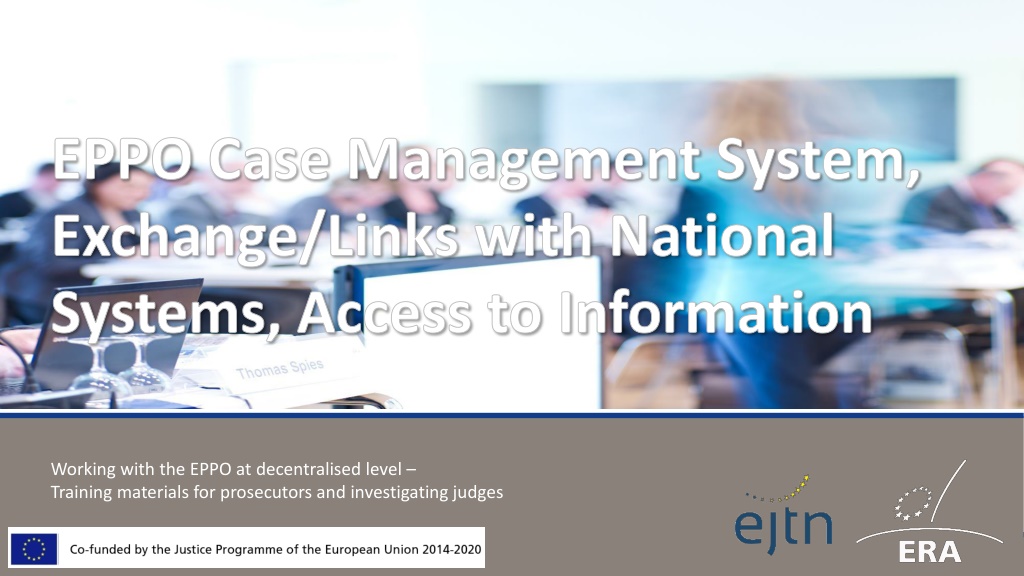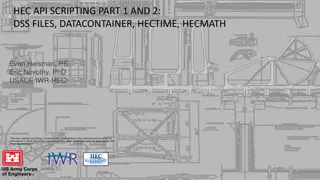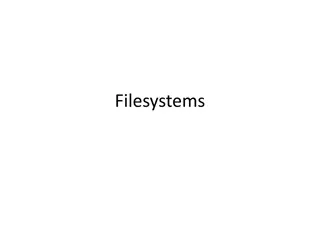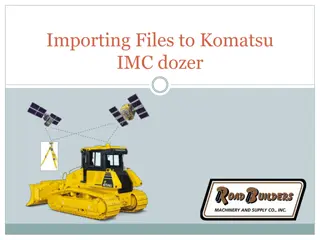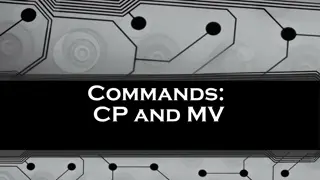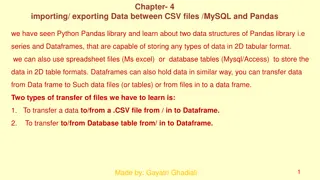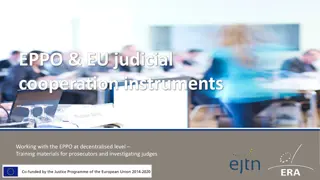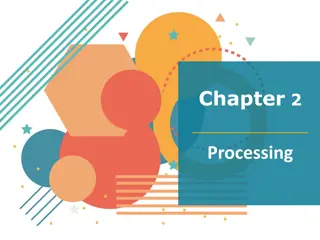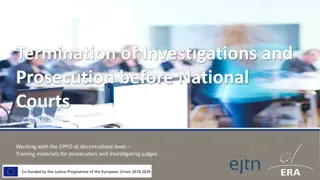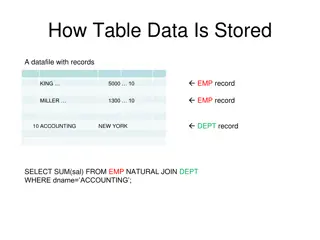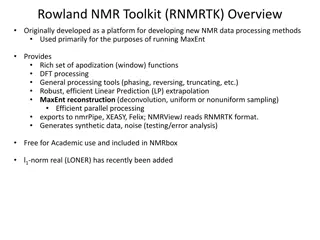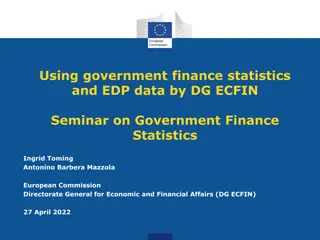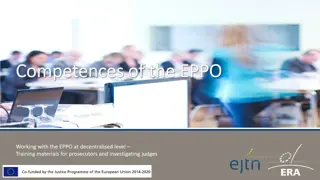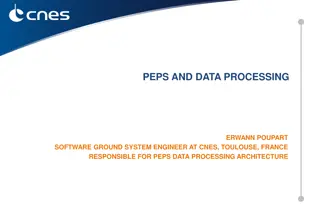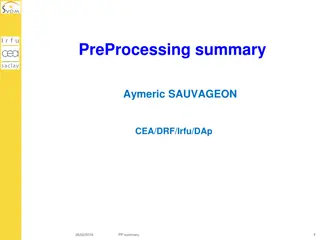EPPO Case Management System: Information Processing and EDP Case Files
Chapter VII of Regulation 2017/1939 delves into the intricacies of information processing at the EPPO central level, encompassing data handling, storage, and access. The regulation outlines the guidelines for EDP case files and the applicable rules when processing information, emphasizing adherence to national law. Questions and answers shed light on the structure of EDP case files within the EPPO framework.
Uploaded on Sep 19, 2024 | 0 Views
Download Presentation

Please find below an Image/Link to download the presentation.
The content on the website is provided AS IS for your information and personal use only. It may not be sold, licensed, or shared on other websites without obtaining consent from the author. Download presentation by click this link. If you encounter any issues during the download, it is possible that the publisher has removed the file from their server.
E N D
Presentation Transcript
EPPO Case Management System, Exchange/Links with National Systems, Access to Information Working with the EPPO at decentralised level Training materials for prosecutors and investigating judges 1
Introduction Chapter VII Arts. 43 to 46 of Regulation 2017/1939 (EPPO Regulation), titled Processing of Information encompasses many different issues: Handling of information at EPPO central level Storing of information at EPPO central level Handling of case file by EDP Storing of information by EDP Access to file held at central level and to file held by EDP for suspect/accused?, for other participants to the same criminal proceedings?, for other EDPs?, for Union institutions, bodies, offices and agencies?, for national authorities? Technical and practical issues: Electronic or hard-copy/paper-based?; different levels of digitalization among Member States? Storage capacity?, which servers will be used? Diversity of case management systems among and also within (federalist) Member States? What is the applicable legal regime on data protection? 2
Introduction Basic principle: Article 5(3) EPPO Regulation: The investigations and prosecutions on behalf of the EPPO shall be governed by this Regulation. National law shall apply to the extent that a matter is not regulated by this Regulation. Unless otherwise specified in this Regulation, the applicable national law shall be the law of the Member State whose European Delegated Prosecutor is handling the case in accordance with Article 13(1). Where a matter is governed by both national law and this Regulation, the latter shall prevail. But what are the applicable rules for the processing of information?, in particular: on the EPPO Case Management System, on the exchange and links with national systems on the access to information held by EPPO 3
Question 1 - EDP case files What does an EDP case file look like? a. EDPs work with the same case files they would use in their own domestic cases. b. All EDPs manage their case files in the same way and pursuant to the applicable provisions of the EPPO Regulation, with details laid down by the EPPO College in the internal rules. c. No EDP case files exist. EDPs handle all information relating to their case through EPPO s central electronic Case management system . 4
Question 1 and Answer What does an EDP case file look like? In principle, the most fitting answer seems a., (EDPs work with the same case files they would use in their own domestic cases), see Article 43(2) EPPO Regulation: (2): The case file shall be managed by the handling European Delegated Prosecutor in accordance with the law of his/her Member State. But that paragraph continues: The internal rules of procedure of the EPPO may include rules on the organisation and management of the case files to the extent necessary to ensure the functioning of the EPPO as a single office. The central CMS mirrors the EDP case file but the actual case file is that of the EDP, see Art. 43(3) EPPO Regulation: (3): The case management system of the EPPO shall include all information and evidence from the case file that may be stored electronically, in order to enable the Central Office to carry out its functions in accordance with this Regulation. The handling European Delegated Prosecutor shall ensure that the content of information in the case management system reflects at all times the case file, in particular that operational personal data contained in the case management system is erased or rectified whenever such data has been erased or rectified in the corresponding case file. And see also Article 28: (1): The handling European Delegated Prosecutor shall report through the case management system to the competent European Prosecutor and to the Permanent Chamber any significant developments in the case, in accordance with the rules laid down in the internal rules of procedure of the EPPO. 5
Case Management System Article 44 EPPO Regulation Case management system: (see similar provisions in Art. 23 Eurojust Regulation) (1): EPPO Case Management System (CMS), held and managed in accordance with the rules established in EPPO Regulation and in the EPPO internal rules of procedure (2): purpose of CMS EPPO internal purposes (a): support management of investigations and prosecutions conducted by the EPPO, in particular: internal information workflows, and supporting investigative work in cross-border cases; (b): secure access to information on investigations and prosecutions at the Central Office and by the European Delegated Prosecutors (EDPs); (c): cross-referencing of information and the extraction of data for operational analysis and statistical purposes; (d): monitoring data protection by EPPO See Articles 61 and 62 of the IRP Internal Rules of Procedure (Decision 003/2020 of the College) on the CMS. 6
Case Management System Article 44 EPPO Regulation Case management system: (3): CMS may be linked to the EJN secure telecommunications connection , see Art. 9(2) and (3) of Council Decision 2008/976/JHA (EJN Decision) and Art. 23(3) Eurojust Regulation. . only optional to link CMS to EJN Secure Network Connection; same possibility as for Eurojust under Art. 23(3) of the Eurojust Regulation; used in all participating Member States/your participating Member State? (4): EPPO CMS shall contain: (a): register of information obtained by the EPPO in accordance with Article 24, including any decisions in relation to that information; (b): index of all case files; shall not contain any operational personal data other than data needed to identify cases or establish cross-links between different case files see Art. 23(2)(a) and (4) Eurojust Regulation, also providing for an index (c): all information from the case files stored electronically in the case management system in accordance with Art. 45(3); 7
Question 2 Link-up with national police How do national police tasked with the investigations in an EPPO case by the handling EDP exchange information with the EDP, and vice-versa? a. National police tasked with an EPPO case will be given read/write electronic access to the EDP s case file to the extent permitted by the handling EDP. b. This exchange is managed through the national systems. The EDP and his/her case file are linked to the national system as provided for by national law. c. The EDPs will not be linked with the national police systems. He/he will receive information from police and then enter it into his/her case file and the EPPO case management system, or retrieve material from them and transmit it to police. 8
Question 2 and Answer? How do national police tasked with the investigations in an EPPO case by the handling EDP exchange information with the EDP, and vice-versa? The EPPO Regulation does not provide for CMS access to national police, i.e. answer a. seems incorrect. Whether answer b. or c. applies, depends on the implementation in the participating Member State. Article 43: (2): The case file shall be managed by the handling European Delegated Prosecutor in accordance with the law of his/her Member State. The internal rules of procedure of the EPPO may include rules on the organisation and management of the case files to the extent necessary to ensure the functioning of the EPPO as a single office. Access to the case file by suspects and accused persons as well as other persons involved in the proceedings shall be granted by thehandling European Delegated Prosecutor in accordance with the national law of that Prosecutor s Member State. Article 5: (3): The investigations and prosecutions on behalf of the EPPO shall be governed by this Regulation. National law shall apply to the extent that a matter is not regulated by this Regulation. Unless otherwise specified in this Regulation, the applicable national law shall be the law of the Member State whose European Delegated Prosecutor is handling the case in accordance with Article 13(1). Where a matter is governed by both national law and this Regulation, the latter shall prevail. 9
Question 3 - Internal access to case files though the CMS Who can access the EDP s case file? a. All EPPO members (European Chief Prosecutor, European Prosecutors, and all of the European Delegated Prosecutors) if they demonstrate their justified interest. b. The European Chief Prosecutor without further conditions, all other EPPO members (European Prosecutors und European Delegated Prosecutors) if they demonstrate their justified interest. c. The supervising European Prosecutor und the competent Permanent Chamber only. d. The supervising European Prosecutor only. e. The supervising European Prosecutor and the competent Permanent Chamber without further conditions, European Delegated Prosecutors if they demonstrate their justified interest. 10
Question 3 and Answer Answer e. is correct, but note that the national law of the handling EDP governs the test of justified interest. Internal access to case files within EPPO is thus quite restricted. Article 46EPPO Regulation: The European Chief Prosecutor, the Deputy European Chief Prosecutors, other European Prosecutors and the European Delegated Prosecutors shall have direct access to the register and to the index. The supervising European Prosecutor as well as the competent Permanent Chamber shall, when exercising their competences in accordance with Articles 10 and 12, have direct access to information stored electronically in the case management system. The supervising European Prosecutor shall also have direct access to the case file. The competent Permanent Chamber shall have access to the case file at its request. Other European Delegated Prosecutors may request access to information stored electronically in the case management system as well as any case file. The handling European Delegated Prosecutor shall decide on granting such access to other European Delegated Prosecutors in accordance with applicable national law. If the access is not granted, the matter may be referred to the competent Permanent Chamber. The competent Permanent Chamber shall, to the extent necessary, hear the European Delegated Prosecutors concerned and then decide in accordance with applicable national law as well as this Regulation. The internal rules of procedure of the EPPO shall set out further rules regarding the right to access, and the procedure to establish the level of access to the case management system by the European Chief Prosecutor, the Deputy European Chief Prosecutors, other European Prosecutors, the European Delegated Prosecutors and the staff of the EPPO, to the extent required for the performance of their duties. 11
Question 4 Access to databases by the EPPO Can EDP access the criminal records database in your Member State? a. Yes, directly and under the same conditions as national prosecutors. b. Yes, directly but without restriction that would apply to national prosecutors (e.g., if data has been blocked for witness protection purposes, information would still have to be revealed to EDP). c. No, not directly, but EDP can task national police which can. 12
Question 4 and Answer Can EDP access the criminal records database in your Member State? a. Yes, directly and under the same conditions as national prosecutors. b. Yes, directly but without restriction that would apply to national prosecutors (e.g., if data has been blocked for witness protection purposes, information would still have to be revealed to EDP). c. No, not directly, but EDP can task national police which can. Answer a. is correct, although this does not rule out to instruct police, see c. Article 43 EPPO Regulation: (1): European Delegated Prosecutors shall be able to obtain any relevant information stored in national criminal investigation and law enforcement databases, as well as other relevant registers of public authorities, under the same conditions as those that apply under national law in similar cases. 13
Thank you for your attention WWW.EUROPEAN.LAW
